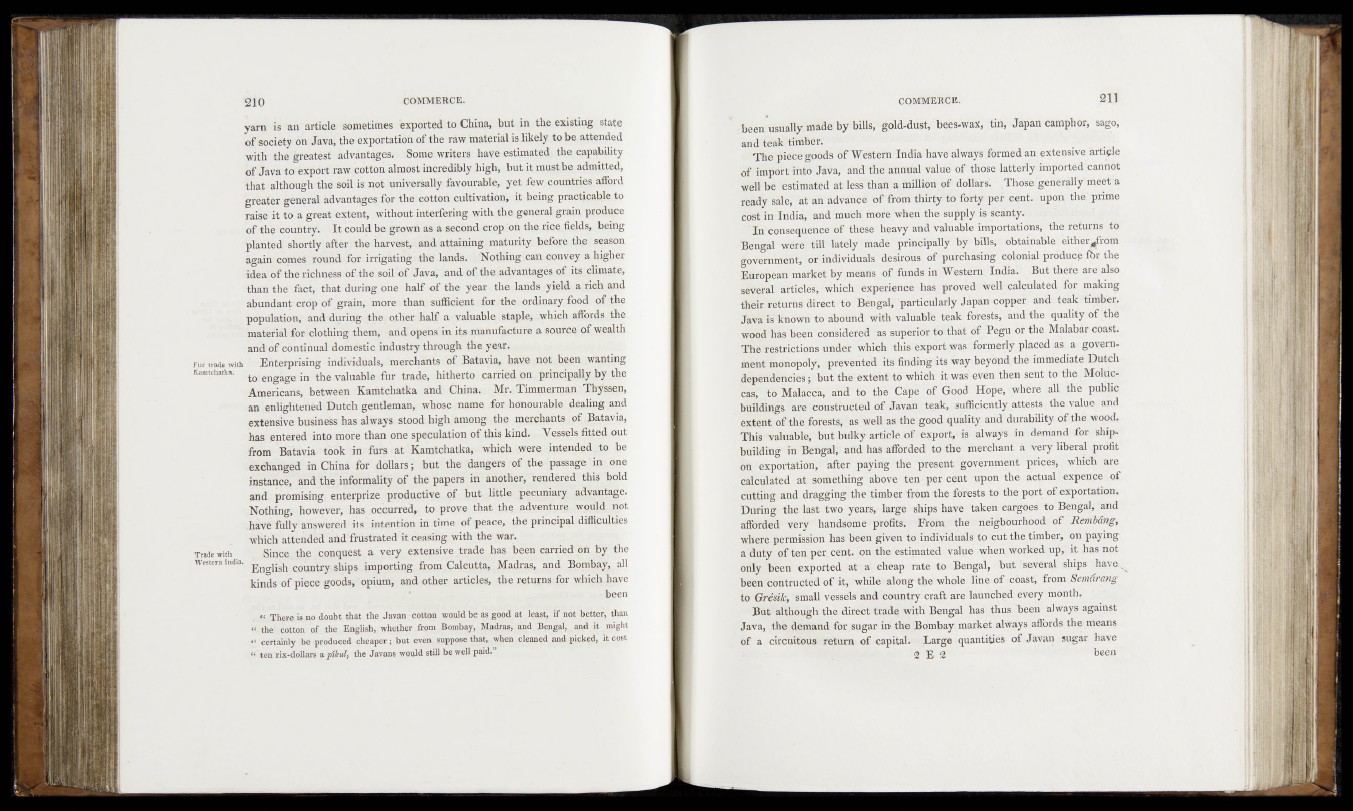
yarn is an article, sometimes exported to Cbinai to t in the existing state
0£ society on java, the exportation of the raw material is likely to be attended
with the greatest advantages. Some writers havfe estimated, the capability
of Java to export raw cotton almost incredibly high* but it must,be adpnitted,
that although the soil is not universally favourable, yetffew countries afford
greater general advantages for the cotton cultivation, it: being practicable to
raise it to a great extent, without interfering with the, general grain produce
of the country. Hit could be grown as a second cijop on the rice.fields, being
planted shortly after: the: harvest, and attaining maturity before .the; season
again comes round for irrigating the lands. 'Nothing;can conyey a higher
idea of'therichness of the soil 'of Java, and of, the advantages qf,,il§j>timate;
than the fact,, that during one 'half of the year the,.lands -yield a rich and
abundant crop of grain, more than sufficient for the ordinary food ofjthe
population, and during the, other half a valuable staple, which, affojflfythe
material for clothing them, arid-0Pens in its manufacture a Source ;Qf wealth
and of continual domestic industry through the year.
Fur trade with Enterprising individuals, merchants. ,of Batavia, haye .not; been wanting
Kajntchafe; tQ eng^ e jn the valuable fur trade, hitherto .carried on, principally by the
Americans, between Kamtchatka and China. Mr. Timmej-man Thyssen,
an enlightened Dutch gentleman, whose name for honourable dealing ;and
extensive business has always stood high among ^ merchants .pfjBatavia,
has entered into more than one speculation of this kind.. Vessels fitted out
from Batavia took in furs % Kamtchatka, which were, intended .ty. be
exchanged in China for dollars; but the dangers'ofi-tto passage intone
instance, and the informality of the papers in another, rendered thiTbold
and promising enterprize productive of but-.little, pecuniary ajs||antage.
Nothing, however, has occurred, to~prove that the adventure, .wpuld^qot
h a v e fully answered its intention in time of peace, the principal.difficulties
wiiihh attended and frustrated if ceasing with the War.
Trade with „ Since „Jhg conquest a very extensive trgde has been carried on by-the
Western India, cototry. ships importing from Calcutta, Madras, and Bombay^ all
kinds of p i e c e goods, opium, and other articles, tbe:returns£qr which Jfave
^ been
, m There is no doubt that the Javan -'cottoff would be as good at .least, if not better, than
“ the' .cotton p£ ,the English, whether from Bombay, Madras, and Bengal, and. it, might
•« certainly be produced cheaper; but even suppose that* when cleaned and picked, it cost
-%: ten rix-dollars apikul, the Javans would B f he well paid.”
. been usually, made by bills,' gold-dust, ;bees-waX, tin, Japan camphor, sago,
and tituber:' • . . . .
' Thë'piébe ’goods of Western India have always formed an extensive article
of import irife Java, - and the annu'al'Value 'of'-those latterly imported cannot
well be estimated at less1 than'a million o£f dollars'. , Those generall/ meet a
ready sale, at an advance of from'thirty*to forty per cent, upon the' prime
é'ôStinr India, and'much môre when the supply; is scanty. - i
In consequencé-ôf these heavy and valuable importations', the returns to
Bengal werev till lktelÿ.‘made ' principally by' bills?' obtainable either^iom
government, or individuals desirous of purchasing colonial produce fbr the
European market byjnëans of funds in .Western; India’.' But there are also
several articles, which'experience has 'proved1 - well; 'calculated,;for making
their returns direct 'to Bengal, particularly Japan copper and teak timber.
Java iffitnown to abound with‘valuable teak forests, and the ^qualify of the
wood has been considered as superior to-that of-Tegu of the, Malabar coast.
T^e?ferictions under which 'this-export yvas:.fôrmeriÿ placed as a govem-
menfraonopoly, prevented its finding its way beyond the immediate Dutch
dependencies j but the extent to which it was' even then sent tctfthe Moluccas,
to Malacca, and to the Cape of Good; iH'ope, where all the public
buildings are constructed, of Javan teak, sufficiently attests the value- and
extent of the forests; as well as the good quality- and durability of.the wood.
This valuable,-but blilky‘article of export,-is always , in demand for shipbuilding
in Bengal, and has afforded to the Merchant a very liberal profit
oh exportation," after paying the présent government price's, which are
calculated at something • above, ten per cent upon th e , actual, expence of
cutting, and dragging the timber from the forests to the port of exportation.
During the last two years, large ships have taken cargoes to Bengal, and
afforded-very handsome profits. From the ;; neighbourhood > of RembâHg,
where, permission has been given to individuals1 to knit the timber, on paying
a duty often per.cent. on the estimated value when worked up,Vit has not
only toen exported, at a- cheap rate * to- Bengal, to t .’several ships have^
been contructed of it} while along the-whole line of coast, from Semurang
to Grésik, small vessels and country craft are launched-every month.
But- although the direct trade with Bengal has thus been always against
Java, the demand for. sugar in. the Bombay markèt. always affords the means
of a circuitous return of capital. Large quantities of Javan sugar have
2 E 2 been